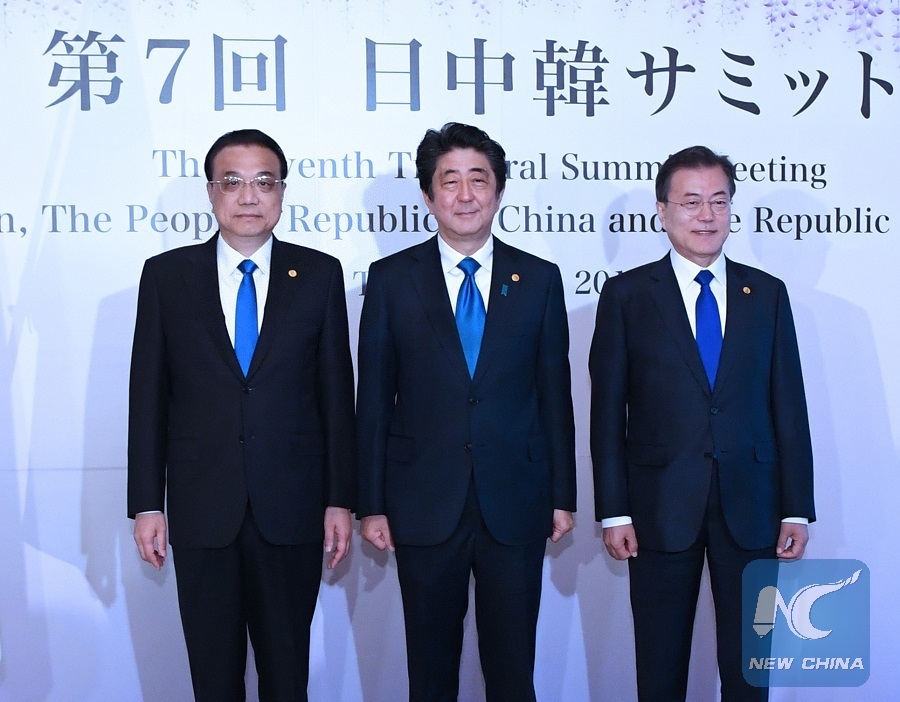
Chinese Premier Li Keqiang, Japanese Prime Minister Shinzo Abe and South Korean President Moon Jae-in (L-R) attend the 7th China-Japan-South Korea leaders' meeting in Tokyo, Japan, May 9, 2018. (Xinhua/Rao Aimin)
SEOUL, May 10 (Xinhua) -- A trilateral economic cooperation between China, Japan and South Korea will play a key role in boosting regional stability and prosperity as well as the global economic recovery, an expert said here Thursday.
"The trilateral economic cooperation will play an important role in fostering the world economy's recovery as well as regional stability and co-prosperity," Lee Jong-heon, secretary-general at the Trilateral Cooperation Secretariat (TCS), told Xinhua.
Lee referred to the joint declaration issued after a meeting in Tokyo Wednesday between Chinese Premier Li Keqiang, Japanese Prime Minister Shinzo Abe and South Korean President Moon Jae-in.
The three leaders reaffirmed their commitment to building an open world economy and vowed to further promote free trade.
Lee said the three leaders saw the trilateral economic cooperation as an important axis of cooperation and agreed to strengthen economic cooperation.
The three leaders, Lee noted, stressed an importance for the three parties appealing to the importance of free trade to overcome challenges, such as protectionist moves, facing the world's economic order.
The South Korean expert said the agreement from the trilateral summit will become a very important ground laid for the upcoming negotiations for the Regional Comprehensive Economic Partnership (RCEP) and the trilateral free trade agreement (FTA) between China, Japan and South Korea.
Referring to the agreement to strengthen a trilateral cooperation in non-traditional security sectors, such as energy, environment and disaster management, Lee said the issues will be more significant and urgent than any that should be tackled together by neighboring countries.
A strong cooperation between the three countries in the sector is directly linked to health and welfare of ordinary people, he noted.
The leaders of the three Northeast Asian countries met after the successful summit between South Korea and the Democratic People's Republic of Korea (DPRK), which was held on April 27 at the border village of Panmunjom.
The two Koreas agreed to complete denuclearization and the turn of the current armistice agreement into a peace treaty by the end of this year. The Korean Peninsula remains technically at war as the 1950-53 Korean War ended with armistice.
Lee said the three leaders had an in-depth discussion on regional security cooperation after the inter-Korean summit, noting the leaders shared a view over the countries' responsibility for and commitment to resolving issues on the Korean Peninsula and advancing the process of the peninsula's denuclearization.
The three leaders, he noted, made it known to the entire world for the three parties to make concerted efforts for the denuclearization by adopting a special statement welcoming the Panmunjom Declaration, announced after the inter-Korean summit.
Changing security situations on the peninsula will contribute to peace and stability on the peninsula, in Northeast Asia and in the world, the TCS chief noted.
Citing the three leaders stressing the importance for future-oriented friendship and cooperation, Lee said the leaders agreed to expand human exchanges between the three countries to 30 million by 2020 and foster cultural exchange.
The leaders also agreed to strengthen trilateral exchange among younger generations and in the educational sector, which Lee said would maintain and develop the friendly relations between the three countries in the next generation.

